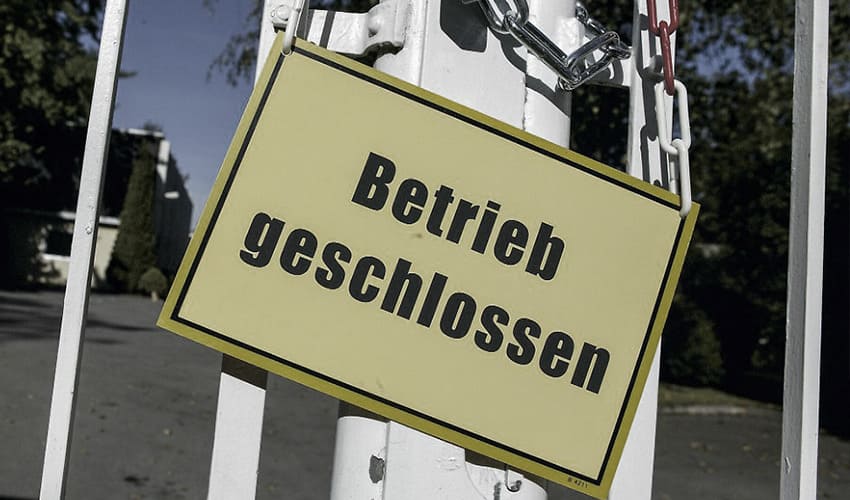
Company closure - What rights does the employee have?
Conditions in the economy are constantly changing - especially in light of the current coronavirus crisis. This process is repeatedly leading to company closures. This is hitting many employees hard. But you are not completely at the mercy of this situation.
The law firm Haas und Kollegen from Eschborn near Frankfurt am Main has already accompanied numerous employees throughout Germany through this difficult time and, in addition to successful dismissal protection claims, has also been able to obtain high severance payments for them. If you have received notice of termination due to a company closure, it is advisable to contact an experienced employment law attorney who will support you in this situation and protect your rights as an employee.
In the current time of crisis due to Corona, many employees are facing a company closure. In this legal tip, we want to give you basic information about your rights in this situation, which, however, can only anticipate individual advice from an employment lawyer, but cannot make it superfluous. Now to the question: What rights does the employee have in the event of a company closure?
Table of contents:
- What is a plant closure?
- Does a plant closure justify dismissal for operational reasons?
- Can I take action against a dismissal for operational reasons in the event of a plant closure?
- What are the prospects of success for an action for unfair dismissal
- Am I entitled to a severance payment if I am dismissed for operational reasons?
- Am I entitled to a job at another location if the company closes?
- Company closure during maternity leave - can I still be dismissed?
- Company closure during parental leave - can I still be dismissed?
- Are there any special protection against dismissal in the event of a business closure?
- Employment law lawyer in Eschborn near Frankfurt am Main
1. what is a business closure
First of all, you need to know when a business exists. A business is an independent organizational and spatial unit with a certain number of employees in a company. The organizational structure is therefore decisive. A company can therefore consist of several establishments. The prime example is an organizationally independent production plant within a company that manufactures products. It is also possible that several interconnected branches (which are considered parts of a company) together form a company.
In the event of a plant closure, this individual production plant is permanently discontinued. This is a case of a change in operations as described in Section 111 BetrVG. The company as a whole may therefore continue to exist. If production in this plant is only temporarily suspended, this does not constitute a plant closure.
2. does a plant closure justify dismissal for operational reasons?
The answer is yes. However, the employer must observe certain rules.
Dismissals for operational reasons are always possible if urgent operational requirements make it permanently impossible to continue employing the employee. This is always the case if the job in question is permanently eliminated due to a business decision. It is completely irrelevant whether this business decision makes economic sense or not.
Companies can therefore be closed even though they generate a profit.
3. can I take action against a dismissal for operational reasons in the event of a plant closure?
In principle, yes. You can take legal action against your dismissal with an action for protection against dismissal. However, the prerequisite is that your job is subject to the Dismissal Protection Act. The following requirements must be met:
- You must be an employee within the meaning of Section 611a BGB. Accordingly, an employee is anyone who undertakes to perform work in the service of another person on the basis of a contract, subject to instructions and in a relationship of personal dependence.
- At least 10 employees (at least 5 employees if hired before 31.12.2004) are employed in the company. Part-time employees are only counted on a pro rata basis according to their working hours.
- The waiting period (probationary period) of six months' employment in the same company has been completed.
However, even if your employment relationship is not subject to the Dismissal Protection Act, an action for dismissal protection may be possible if the dismissal proves to be in breach of trust in the light of Sections 242 and 138 BGB.
An action for protection against dismissal must be brought within three weeks of receipt of the dismissal. For this reason, swift action is required. It is advisable to contact an expert lawyer who can answer the complex question of whether the dismissal for operational reasons is unlawful and act quickly and effectively in this situation.
4. what are the prospects of success for an action for unfair dismissal
This cannot be said across the board. Each individual case is characterized by individual differences, which can influence the chances of success for protection against dismissal in one direction or another.
In addition to the general formalities of the dismissal, the main points of attack are the time at which the dismissal takes place, the legally compliant involvement of the works council (if one exists), compliance with the formalities in the case of mass dismissals and the existence of a correct social selection.
a. Formalities of termination
As with all notices of termination, the legally prescribed formalities such as the written form requirement and the notice period must be observed.
b. Time of termination
If the notice of termination is given at a time when it is not yet clear whether the business will actually be closed or not, the termination is invalid. As it is impossible for an employee to assess this due to a lack of insight into the relevant processes, the onus is on the employer to provide evidence. The employer must therefore prove that it was already clear at the time of the dismissal that the business would be definitively closed.
c. Involvement of the works council
If there is a works council in your company and the company generally has more than 20 employees, the employer must inform it comprehensively and in good time about the intended closure and consult with it. The employer is obliged to attempt to reach a reconciliation of interests with the works council. In this, the employer and works council negotiate the "whether" of the closure. However, the employer is only obliged to conduct negotiations, not to reach a specific agreement.
If the employer does not fulfill its obligations towards the works council, the dismissal may be invalid.
d. Formalities for mass terminations
In the event of company closures, mass redundancies are often issued. This is already the case if five employment contracts are terminated in a company with 20 employees. Special legal requirements apply to these in accordance with § 17 KSchG. If these are not complied with by the employer, the dismissal is invalid.
e. Correct social selection
In the event of a business closure, it is often not necessary to carry out a social selection, as all employment relationships are eliminated. However, if only individual branches within a company are closed, or if the company is to be closed in stages, the employer must make a corresponding social selection. The provisions of Section 1 (3) KSchG apply to this.
If the employer makes a mistake here, this will result in the termination being invalid.
It is often difficult to assess whether a termination is effective or not. By instructing an experienced lawyer, you can significantly increase your chances in such a process.
5. am I entitled to a severance payment in the event of dismissal for operational reasons?
Even if severance pay is often agreed, you unfortunately have no fixed legal entitlement to it. It is basically up to your employer to decide whether to pay a severance payment. They can agree this directly with you or the works council as part of a negotiation.
If the company has more than 20 employees, the employer is generally obliged to agree a social plan with the works council in the event of plant closures. If no agreement is reached, a social plan is determined by a conciliation committee. Severance payments are regularly stipulated as part of these social plans. However, it is often possible to obtain even higher severance payments as part of a dismissal protection action.
The employer can also undertake to pay a severance payment in accordance with Section 1a KschG. This is the case if the termination is structured in accordance with the conditions set out therein. First of all, the existence of urgent operational requirements must be explicitly stated as a reason for termination. Furthermore, the letter of dismissal must contain a note that the employee is entitled to a severance payment if he does not file an action for protection against dismissal within the three-week period. If all of these criteria are met and the employee fails to file an action for protection against dismissal within the deadline, they are entitled to a severance payment of half a month's pay for each year of service. However, if one of these characteristics is missing, they must defend themselves against the dismissal in good time by filing an action for protection against dismissal in order to be able to claim a severance payment.
As dismissals are often contestable even in the event of a company closure, you can often obtain lucrative severance payments. You should therefore seek advice from a competent lawyer in advance.
6. am I entitled to a job at another location if the company closes?
Of course, it depends on whether there is a complete closure of the business or merely the closure of individual parts of the business (branches). This depends on the degree of autonomy, which is why it is often not easy to determine whether it is a business as such or a part of a business.
If the entire company is closed, there is no right to a job at another location of the company. However, if only one part of the business is closed, there may be a right to a job in another part of the business.
If other locations remain in the company, the employer may also give notice of termination. In order to better assess the chances of success of such a complex procedure, you should definitely seek legal advice.
7 Special protection against dismissal in the event of business closure - can I still be dismissed?
There is special protection against dismissal for particularly vulnerable groups of people, such as pregnant women, employees on parental or care leave or the severely disabled. However, in the event of a company closure, they can still be dismissed, as all jobs are permanently lost. Dismissals are therefore also possible during maternity leave, parental leave, care leave and for severely disabled employees. However, the employer must first obtain permission from the competent authority and wait for its approval. If this is not done, the dismissal is invalid and should be challenged with an action for unfair dismissal.
8. are there special protection against dismissal in the event of a business closure?
Whether special termination provisions exist depends on the specific individual case. For example, there are special termination provisions
- If a works council exists and the company has more than 20 employees pursuant to § 111 BetrVG
- In the event of collective redundancies pursuant to § 17 KSchG
- In the case of maternity protection in accordance with 17 MuSchG
- During parental leave pursuant to § 18 BEEG
- During the care period pursuant to § 5 PflegeZG
- In the case of severely disabled persons pursuant to § 168 SGB IX
However, there is no special protection against dismissal for ordinary members of the works council in the event of a closure of the company.
9 Conclusion on employee rights in the event of a plant closure
- A distinction must be made between the closure of a business and the closure of only parts of the business.
- The closure of the business constitutes a reason for dismissal for operational reasons.
- There is also protection against dismissal for operational reasons due to a plant closure.
- The action for protection against dismissal must be filed within the three-week period.
- As dismissals can also be challenged in the event of a company closure, lucrative severance payments can be obtained.
- An entitlement to a job at another location can only exist if only part of the business is closed.
- Even if there is special protection against dismissal, dismissal is possible in the event of a business closure.
- If there is special protection against dismissal, the employer must observe further, additional statutory regulations, which can lead to the dismissal being invalid in the event of violations.
Labor law lawyer for company closures in Eschborn near Frankfurt am Main
If you as an employee are affected by a company closure, you should promptly instruct an experienced lawyer to review the dismissal in order to get the best out of the situation for you. The law firm Haas und Kollegen from Eschborn near Frankfurt am Main is characterized by years of experience and legal expertise in dismissal protection claims and the negotiation of severance payments. The law firm's lawyers represent employees nationwide in employment law and beyond. Do you have legal questions or do you need assertive representation? Then contact us now:
Contact the law firm Haas und Kollegen now:
Rudolf-Diesel-Str. 5, 65760 Eschborn near Frankfurt









A comment
rolf
Thanks for the great article about the closure of businesses. I notice that more and more businesses are having to close, which is why I wanted to find out more about the law. It's interesting to know that as an employer you can terminate your employees with notice. Thank you!